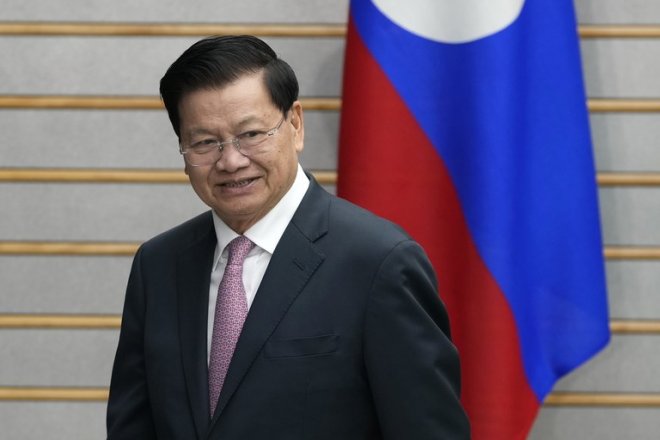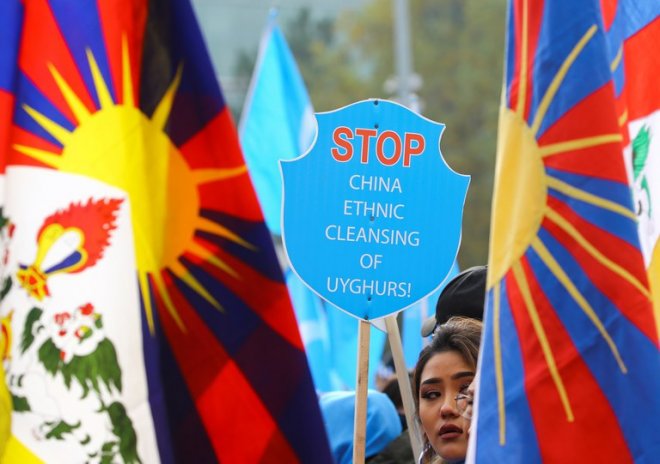Chinese talent show host banned from Weibo over anti-Putin comments
A Chinese talent show host has been banned from the popular Weibo social media platform after he criticized online support for Russian President Vladimir Putin as internet censors launched a "strike hard" campaign against bloggers and live streamers who post unauthorized content."Due to violations of the relevant rules, this user has been banned," a notice on Weibo read where comments by comedian Zhou Libo had once been found.
Zhou"s post had hit out at online support for "Putin the Great," criticizing his "band of fighters" among Chinese social media accounts and making reference to territory ruled by Russia that he said should belong to China.
"Why are there always some Chinese who inexplicably send such kind words to Russia?" the post said.
"Do you still see him as a father? Friendship is okay, but flattery is not," read the post, which was deleted when Radio Free Asia attempted to view it on Monday.
The move came ahead of a visit by Chinese leader Xi Jinping to Russia, according to a Reuters report citing people familiar with the matter.
Plans for a visit come as China has been offering to broker peace in Ukraine, an effort that has been met with skepticism in the West given Beijing"s diplomatic support for Russia, the agency said.
Neither Beijing nor Moscow have confirmed the report, with foreign ministry spokesman Wang Wenbin telling reporters on Tuesday: "I have nothing to share at the moment."
Xi needs ‘stable international environment’
Tao Yi-fen, an associate professor of politics at National Taiwan University, said the economy and regime security are currently Xi"s highest priorities as leader.
"Xi Jinping is most concerned with the economy and security matters right now, and he needs a more stable international environment," he said.
 Chinese leader Xi Jinping plans to visit Russian President Vladimir Putin, according to Reuters news agency. Credit: Pool via Reuters file photo
Chinese leader Xi Jinping plans to visit Russian President Vladimir Putin, according to Reuters news agency. Credit: Pool via Reuters file photo"The United States has been putting a lot of pressure on China, economically and militarily speaking, and the rest of the world is seeing that Xi Jinping has become more and more totalitarian in the wake of the 20th party congress” held in October 2022, Tao said.
"My guess is that China is actively trying to project itself to the rest of the world as a defender of the international order, not its destroyer," he said.
Spokesman Wang"s comments appeared to back up this view.
"When viewing and addressing international and regional hotspot issues, China always upholds our foreign policy goals of safeguarding world peace and promoting common development," he said. "We are committed to the peaceful settlement of conflicts including through diplomatic negotiations."
‘Rumor-mongering’
Zhou"s Weibo ban also came as China"s Cyberspace Administration launched a two-month crackdown on "rumor-mongering" by citizen journalists and bloggers targeting social media platforms, video platforms and webcasts.
"We must effectively improve our political standing and fully understand the significance of rectifying the chaos that is citizen media," the agency said in an announcement on its website dated March 12.
"It is inevitable if we are to win the online ideological struggle and maintain national security and political security," it said, citing a recent meeting on the subject.
 Chinese Foreign Ministry spokesperson Wang Wenbin says China is “committed to the peaceful settlement of conflicts including through diplomatic negotiations." Credit: Associated Press file
Chinese Foreign Ministry spokesperson Wang Wenbin says China is “committed to the peaceful settlement of conflicts including through diplomatic negotiations." Credit: Associated Press file"We must severely punish citizen media that spread rumors and interfere with and destroy the online environment, and keep up the purification of cyberspace," it said.
It said designated content managers should be chosen to spearhead that campaign at all major internet platforms, and that content creators who put out undesirable content to attract followers should have their fan-bases deleted.
Bloggers commenting on government policy, the economy or those who report on major disasters and current events by themselves should be the targets of the "strike hard" campaign, the agency said.
A veteran leftist blogger who requested anonymity said that there have been similar purges before, but that the authorities are aiming to let nobody slip through the net on this campaign.
He said the allegations of rumor-mongering were just an excuse to limit what people can say on social media.
"It"s just one giant category that contains anyone and everyone," he said. "As long as you are online you can be deemed guilty."
"They just don"t want anyone saying anything much during this transition of power," he said in a reference to Xi Jinping"s third and likely indefinite term as president and supreme party leader.
"They can pin anything on you at any time -- running an illegal business, picking quarrels and stirring up trouble," he said. "Anyone can be said to have committed a crime."
"If they want to go after you, they"ll just find an excuse ... and do it," he said.
Cyberspace policing
An official who answered the phone at the Tianjin municipal branch of the Cyberspace Administration said they had received the directive and will be ensuring that the main burden of the crackdown falls on internet service providers.
"This document is very clear, which is to say that our reporting center will get tip-offs, and if it"s a case of market supervision, it will be transferred to that department," the official said.
 People walk past an office of the Cyberspace Administration of China, which recently launched a two-month crackdown on "rumor-mongering" by citizen journalists and bloggers, in Beijing. Credit: Reuters file photo
People walk past an office of the Cyberspace Administration of China, which recently launched a two-month crackdown on "rumor-mongering" by citizen journalists and bloggers, in Beijing. Credit: Reuters file photo"If some greater harm has been done, it may be transferred to the police for them to deal with, so you should contact whichever department is involved in the case," they said, but declined to give further details about how the crackdown would be implemented.
Repeated calls and email requests for comment to the Cyberspace Administration of China went unanswered by the time of publication.
An internet user in the northeastern city of Shenyang who gave only the surname Zhang said her Weibo and WeChat accounts have been suspended many times.
She said even complaints relating to people"s daily lives, such as recent reforms to medical insurance payouts that sparked mass protests in recent weeks, could get someone banned.
"I don"t know what kind of socialism this is," she said. "It"s the socialism of corrupt officials."
"This is a dictatorship, and a hellish country for ordinary people," Zhang said. "They talk about the rule of law every day, and yet they have no confidence."
Translated by Luisetta Mudie. Edited by Malcolm Foster.
[圖擷取自網路,如有疑問請私訊]
|
本篇 |
不想錯過? 請追蹤FB專頁! |
| 喜歡這篇嗎?快分享吧! |
相關文章
AsianNewsCast























